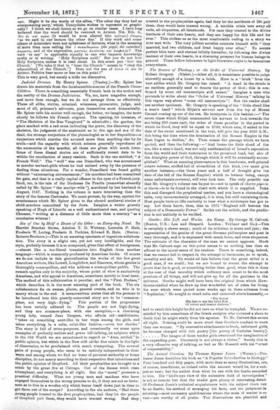Goethe: His Life and Works. Au Essay. By George H.
Calvert. (Boston, U.S.: Lee and Shepard. London : Triihnor and Co.)—This is certainly a clever essay; much of its criticism is acute and just ; the appreciation of the genius of the great German philosopher and poet is very thorough, and it is expressed with much force, and even eloquence. The estimate of the character of the man we cannot approve. Much that Mr. Calvert says on this point seems to us nothing less than an affront to the moral sense of his readers. There is something, indeed, that we cannot fail to respect in the attempt to harmonise, so to speak, morality and art. We would all fain believe that the great artist is a good man, if we could ; but we are bound to resent the attempt to prove that he is good, or something hotter than good, when this is done at the cost of that morality which ordinary men count to be the most Precious of all things, and will not give up for all the geniuses in the universe. Goethe might well have been the original from which Haw- thorne studied when he drew up that wonderful set of rules for living for ever which were quoted some weeks ago in these columns from " Septimius." He sought to stand calm and unmoved above humanity,— " Far below the feet to see the lurid flow Of terror and insane distress,"
and to reach this height ha did not care on what he trampled. We are re- minded by him sometimes of the Greek sculptor who tortured a slave to death that he might study from his agonies. To Mr. Calvert this seems all right. Nothing could be more cruel than Goothe's conduct to more than one woman. "By successive attachments to fresh, unformed girls, he became charged with this poetry [the poetry of feminine beauty].
The images of these tender girls sweetened the imagination of the expanding poet. Constancy is not always a virtue." Surely this is a very offensive way of talking, as bad as Mr. Rossetti with his "crust of respectability."


































 Previous page
Previous page